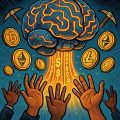Nigeria Declares Openness to Crypto Companies Despite Conflict with Binance
Nigeria’s Minister of Information Mohammed Idris stated that the country remains open to cryptocurrency companies, despite its ongoing legal battle with Binance, the world’s largest crypto exchange.
The Nigerian government is concerned that cryptocurrencies can be used for terrorism financing, money laundering, and tax evasion, Idris explained. This issue is not exclusive to Nigeria, as many other countries are also struggling to combat the illicit use of digital assets on a global scale.
According to Idris, all crypto transactions must comply with the law.
Conflict with Binance
In February, Nigerian authorities filed a lawsuit against Binance, demanding that the exchange pay $79.5 billion in compensation for the alleged economic damage caused by the collapse of the Nigerian naira. Additionally, regulators accused Binance of owing $2 billion in taxes.
Binance refused to comply with these demands, and its regional manager, Tigran Gambaryan, was arrested and spent eight months in detention before being released with all charges dropped.
Following the dispute, Binance ceased all operations in Nigeria in March 2024, but the country has reaffirmed its openness to other crypto projects.
North Korea Becomes the Third Largest Holder of Bitcoin
North Korea has now ranked among the top three countries with the largest strategic BTC reserves, surpassing nations such as Bhutan and El Salvador.
Analysts estimate that after laundering stolen ETH, North Korea retained 13,580 BTC, worth approximately $1.14 billion.
This places North Korea as the third-largest state holder of Bitcoin, behind only:
— The United States (198,109 BTC)
— The United Kingdom (61,245 BTC)
According to Binance estimates, North Korea now holds more BTC than:
— Bhutan (10,635 BTC)
— El Salvador (6,117 BTC)
How Did North Korea Accumulate Bitcoin?
Experts suggest that a significant portion of North Korea’s BTC reserves were acquired through cyberattacks and illicit activities, often linked to the Lazarus Group.
It is widely believed that most of the funds generated from these operations are used to finance North Korea’s ballistic missile and nuclear programs.
If these claims are confirmed, this could lead to stricter international sanctions against North Korea and further efforts to curb illegal crypto operations.
The U.S. Lifts Sanctions on Tornado Cash
The U.S. Department of the Treasury has removed Tornado Cash and its associated crypto addresses from the OFAC sanctions list.
This unexpected decision reverses a previous ruling that banned the service for facilitating anonymous transactions and allegedly enabling money laundering.
Now, restrictions no longer apply to the Tornado Cash website and its Ethereum addresses.
What Has Changed?
— Tornado Cash co-founder Roman Semenov was removed from the OFAC sanctions list, where he had been accused of assisting in money laundering.
— The service is no longer under a direct ban but remains under regulatory scrutiny.
— Major exchanges have yet to reinstate support for Tornado Cash, fearing compliance risks.
Crypto analyst ZachXBT warned that Tornado Cash is still vulnerable to potential security risks, and users should exercise caution when using the platform.
History of Tornado Cash’s Conflict with U.S. Authorities
In 2022, OFAC sanctioned Tornado Cash, arguing that the service was used by hackers for laundering illicit funds.
Developers faced criminal charges, and parts of Tornado Cash’s infrastructure were seized and restricted.
The ban sparked widespread debate within the crypto community, with many arguing that restricting Tornado Cash violated decentralization and privacy principles in cryptocurrency.
Now that the sanctions have been lifted, the project’s future remains uncertain, as many centralized platforms, including major crypto exchanges, continue to block anonymous transactions.
Regulators have not clarified why they reversed the sanctions, but this move could signal a shift in how privacy-focused crypto services are regulated.
This past week has been eventful for the crypto industry:
— Nigeria reaffirmed its openness to crypto companies, despite its legal dispute with Binance.
— North Korea became the third-largest Bitcoin holder, trailing only the U.S. and the U.K.
— The U.S. lifted sanctions on Tornado Cash, marking an unexpected shift in regulatory stance.
These events highlight the ongoing transformation of the crypto market, influenced by regulatory decisions and geopolitical factors.
In the coming months, market participants will closely watch how nations adapt to these challenges and how global crypto regulations evolve.




